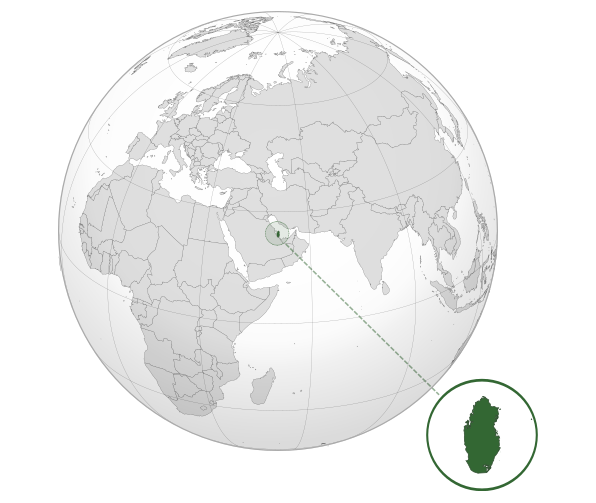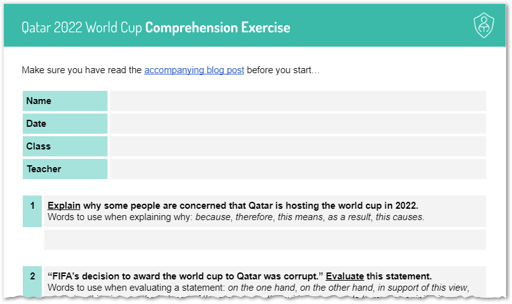Torn: My Approach to the FIFA World Cup 2022 in Qatar
It was 4th July 1990, relatively late in the evening. I was surrounded by coloured glass, including glass in my hair and in my lap*. Stuart Pearce, captain of my boyhood team, Nottingham Forest, was standing four or five metres outside of the penalty area waiting to make his customary long run up to smash a penalty at the goal. I took a deep breath simultaneously with the England player on the screen. Stuart ran forward and struck the ball, which was saved by the West German goalkeeper Bodo Illgner.
DON'T LEAVE until you've seen the FREE classroom resource...

England were on the verge of exiting the 1990 FIFA World Cup in Italy. It was one of the most memorable moments of my football spectatorship and a heartbreaking moment too. Once Chris Waddle had missed his penalty a few moments later, England were officially out and I got up, brushed the glass from me and left the house.
*We were covered in glass because, at the moment of Gary Lineker’s equalising goal in normal time of the match, my dad jumped out of his chair and smashed a large glass pendant light that was hanging just above him. Instead of tidying up, we sat, covered in glass, until the penalty shootout was finished about 40 minutes later. My mum was not impressed and I distinctly remember her trying to hoover up and being shouted at by me, my dad and my brothers for getting in the way of the telly.
At the time, I lived in North Wales in the town (now city) of Wrexham. I had moved there in 1989, when my parents had relocated from Cumbria. I was the English kid in a Welsh town and, as I walked the streets of Borras (a little suburb of Wrexham) towards Acton Park, I heard household after household cheering England’s defeat. I put my head down and cried. I was a footballer… I was an England fan… and my dream was shattered.
I already had World Cup memories from earlier tournaments. I have a vague recollection of watching Bryan Robson score versus France in the 1982 event in Spain. I remember getting up late in the evening after going to bed super early to watch England lose to Argentina in the quarter finals of the 1986 World Cup in Mexico. This was the game where Maradonna scored twice, including his handball goal and his dribbling masterpiece. But what I recall is how close England were to equalising after John Barnes, a second half substitute, had come off the bench to create one goal for Lineker and to very, very nearly create the equaliser for him too.
Since 1990, I have followed England in every tournament and, like pretty much everyone else, have been frustrated and even disillusioned until recently. These days, I get excited to watch England play. I love the teams of Southgate and Wiegmann and I am passionate about their possibilities of success in the next two tournaments. For the men in 2022 in Qatar and, for the women, in 2023 in Australia and New Zealand.
But I am also deeply torn. Like many of the people who will read this post, I am concerned about the political and social context of Qatar and their cultural and legal approach to human rights, diversity and inclusiveness. I am also deeply concerned about the probability that many workers have suffered poor conditions and danger in their work as stadia have been built. Furthermore, I am concerned at what appears to be the nature of Qatar’s bid and the accusation that they did not play fairly in the process to acquire the tournament.
All in all, I am left with this question: Should I - as a person that believes fundamentally in the importance of human rights, inclusiveness and fairness - engage with this event and follow England and Wales (who I love too, having lived there for many years) in their pursuit of World Cup glory?
Rather than simply making a decision about this question and broadcasting what it is on social media or equivalent, I aim to explore the issues and provide a resource that students and teachers can engage with in order to make their own judgement. I will present this as an evaluative piece of writing and will ask readers to form their own decisions based on this information.
I would also like to add at this point that writing about this topic is challenging and I will endeavour to present balanced and factual information throughout. If you believe that I have not achieved this, I would be grateful if you could reach out to me and let me know what your observation is.
A very short and selective history of Qatar
Qatar is a small country in the middle east on the North Eastern edge of the Arabian peninsula. It shares a land border with one other country: Saudi Arabia.
 https://commons.wikimedia.org/w/index.php?curid=20178624
https://commons.wikimedia.org/w/index.php?curid=20178624
Following a period of Ottoman control in the 19th Century, Qatar became British controlled in 1916 and this remained the case until 1971, when independence was agreed and Qatar formed itself into a semi-constitutional monarchy with the Al Thani family directly ruling the country until 2003, when a constitution was formed and allowed for the election of officials to the country’s legislature. Qatar remains controlled by an Emir (literally: ruler) and this person is always from the Al Thani family. Many people argue that Qatar still verges on being an absolute monarchy.
The Qatari constitution states that Sharia law is the fundamental principle by which laws are passed in Qatar but, in practice, the legal system is a combination of civil law and Sharia law.
Qatar is a rich country and this wealth stems from the oil exports which have occurred since 1949.
To help you and your students engage in the debate, we've created a comprehension exercise for you to use with your classes.
Option 1 : Read the blog online, answer the questions online.
You'll need a Google account to make a copy and then you can make notes directly on the document before saving it, in your Google account, as a PDF or printing for your folder.
Click the image to make a copy of the document in your Google account.
Option 2 : Download and print the whole article and answer offline
If you have oodles of printing budget or you need an offline copy, we've produced a printable version of the whole thing including space for the students to write their answer.
Click the image to download the article and exercise in printable form
Should I engage with the FIFA World Cup in Qatar? Arguments against...
Qatar is accused of bribing FIFA officials
It has been widely reported that FIFA’s decision to award the World Cup in 2022 to Qatar was, at least in part, influenced by bribery. In 2010, when the FIFA executive committee voted to elect Qatar to host, two members of the committee had already been found guilty of corruption and specifically taking cash in exchange for their vote and, since the vote, almost the entire committee has been accused, banned or indicted for corruption (see this article from The Guardian regarding what has happened to the committee members since the decision was made). Therefore, the possibility that Qatar’s award of the tournament was corrupt should be taken very, very seriously. This is even starker when you consider how strange the decision to select Qatar appears on paper: Qatar has no cultural history of football and, furthermore, experiences climatic conditions which are almost the opposite to those played in by teams and leagues all over the world. Moreover, Qatar is a very small country (roughly the size of Wales) and their capacity to host fans from 32 different nations is, at best, questionable.
Qatar does not recognise the country of Israel
Qatar, like many other Arab countries, does not recognise the state of Israel. Therefore, had Israel qualified for the World Cup finals, this would have caused a major issue for Israel and for Qatar. Prior to Israel’s non-qualification, Qatar had confirmed that Israel would be allowed to travel to Qatar should they have qualified but many people saw this stance as emblematic of the problems that Qatar posed to the international footballing community.
Qatar’s building of stadia and infrastructure has had a huge environmental impact
FIFA has already confirmed that Qatar 2022 will leave a much bigger carbon footprint than any other world cup event. Of the eight stadia that will be used in November and December 2022, seven needed to be built from scratch and one, whilst spectacular, will be immediately taken down after the last game played there. The other six will be repurposed into hotels or resorts, meaning that the sporting legacy of the event will be minimal in Qatar and that the financial and energy investment into the World Cup will have little to no lasting sporting impact in the country.
The Qatar World Cup has caused far too many migrant worker deaths
In February 2021, the Guardian newspaper reported that 6,500 migrant workers from India, Nepal, Pakistan, Sri Lanka and Bangladesh had died in Qatar since 2010. You can read the article here. This is an average of 12 workers per week from these countries dying in Qatar. Furthermore, data of the deaths of migrant workers from other parts of the world such as Kenya and the Philippines have not been reported at all, meaning the figures could be far higher. In fact, Amnesty International claimed in August 2021 that the figure could be as high as 15,000. The 6,500 or 15,000 deaths referred to above are not recorded in terms of the individual’s occupation, so it is impossible to state exactly how many individuals have died directly as a result of working conditions in the building projects of the World Cup but the following factors should be taken into account:
- The migrant worker population is relatively young and the 6,500 or 15,000 deaths could be considered as an unusual figure in light of the relative age of those that have died.
- Many of the deaths are recorded simply as “natural causes” and no autopsy has been performed.
- It is completely unknown how many workers from other countries have died. It is fair to presume that there are even more deaths.
Qatar provides limited human rights support and has not legalised homosexuality or the “promotion of homosexuality”
Qatar, as previously mentioned, follows a combination of Sharia and civil law to form its constitution. Homosexuality has never been legalised in Qatar and, as such, is illegal. One possible punishment for homosexuality is the death penalty for Muslims, although there are no known cases where the death penalty has been applied. Imprisonment has, however, been applied. Despite changes in the law since 2004 which saw the punishment for sodomy (penetrative sex between men) reduced from five years imprisonment to three years imprisonment, homosexuality remains illegal and this is a matter of concern and offence for many, many people.
In addition, Qatar does not recognise same sex marriage nor civil partnership and the prevailing societal view of homosexuality, transgenderism and cross-dressing is negative.
In 2013, the head of Qatar's World Cup bid team, Hassan Al-Thawadi, said that everybody was welcome at the event, so long as they refrained from public display of affection. "Public display of affection is not part of our culture and tradition", he said. This negative attitude towards public affection is applied to both heterosexual and homosexual couples but, understandably, homosexual people believe that their behaviour is under far more scrutiny than heterosexual people.
Should I engage with the FIFA World Cup in Qatar? Arguments for...
There is no proof of the bribery of FIFA officials and Qatar, like any country, has the right to host sporting competition
Despite many suggestions and claims of corruption, it has never been proven. No direct evidence of payments to FIFA executive members has been found and, as such, claims of corruption can only be considered as possible. Furthermore, Qatar’s bid to host the tournament was extremely well formatted and resourced and their argument to host was and is compelling. It should be remembered that Qatar 2022 is the first time ever that a major world sporting event has been held in a predominantly Muslim country and that Qatar provides a possible glimpse to the future with football, or any other sport, truly reflecting the world as a whole and not being a bastion for the traditional, new-world nations of Europe and the Americas.
Qatar wishes to welcome everyone
It is true that the state of Qatar, like almost all other Arab nations, does not recognise the state of Israel. From Qatar’s perspective, this is a historical stance based on numerous conflicts throughout the 20th Century. However, Qatar has made their stance very clear regarding the world cup: football supporters of all kinds and from all locations are welcome. Therefore, rather than Qatar’s political position regarding Israel being preventative, the Qatar world cup could be seen as a model for developing friendship, ties and future dialogue between nations and peoples of differing opinions and politics. In the case of Qatari-Israel relations, for example, because of this World Cup Israeli citizens are being allowed to enter Qatar and there are even direct flights between the two countries.
Furthermore, Qatar is certainly not the only country to not recognise other nations. For example, the Republic of Kosovo, independent since 2008, is not recognised by over 100 other nations. Palestine, a country whose lands were claimed by Israel in 1967, is not recognised by approximately 100 other nations including Israel. Therefore, it can be argued that this political and diplomatic issue is not related to the issue of the World Cup in Qatar.
Qatar 2022 claims to be an ecological World Cup
Qatar believes that its World Cup will be the first-ever carbon-neutral tournament. Qatar’s sustainability strategy was unveiled in 2020 and confirms that the Qatari tournament will be the first ever where the carbon footprint is measured and will be offset. Therefore, of every World Cup or Olympic Games, Qatar is the only one to make this claim.
Furthermore, because of Qatar’s “compact” geography, air miles and travel as a whole should be far less than many other comparable events.
The reports of migrant worker deaths are inflated
The truth is that no one knows how many migrant workers have died as a result of their work whilst working in Qatar since 2010. The article by the Guardian has been misinterpreted by many people as evidence of over 6,500 deaths. This is not the case. Whilst 6,500 migrant workers have died since 2010, no-one knows how many of these deaths were caused by working conditions.
It may well be the case that working conditions in Qatar have been, at times, less than optimal but the claim of thousands of deaths caused by construction work are not reliable. In many ways, Qatar itself is guilty for this confusion because their own reporting protocols are sub-standard in comparison to much of the world and, as such, it is not possible to accurately analyse the impact of the tournament on migrant workers. This cannot be defended and is not being defended in this piece of writing.
Whether homosexual or not, all people are welcome in Qatar
Understandably, much has been made of Qatar’s legal stance on homosexuality. Neither I nor anyone else can defend a lack of human rights for any individual and this is not the intent of this section. For the record, I support all human rights and I make no defence whatsoever of the illegality of homosexuality in Qatar. However, Qatari authorities have been very clear that people of all kinds are entirely welcome in the country and that no one should be afraid to visit.
It is true that Qatar has asked visitors to refrain from public displays of affection but this applies equally to men, women and relationships of any kind. This is a cultural norm in Qatar and the country has, understandably, asked visitors to respect their traditions and customs.
My own conclusions and the approach I will take.
Firstly, I am deeply uncomfortable with many issues surrounding the Qatar World Cup. I do believe that corruption and bribery are likely to have been at the heart of the award of the event by FIFA and I find this very hard to forget or forgive. Football, to me, is about fairness, honour and effort in the pursuit of happiness, fun and competition. Therefore, believing that the award of the tournament was, on the balance of the evidence, likely to have been achieved by corruption, leaves a very poor taste in my mouth. Having said this, I do not place all of the blame on Qatar. FIFA, a multi-billion dollar organisation is ultimately to blame for this and the likelihood that FIFA officials were corrupt speaks more about FIFA than it does about Qatar in my opinion. I find it bewildering that FIFA did not have protocols and articles that outright prevented this type of allegation. FIFA’s rules should make them utterly transparent and outright incorruptible. This was definitely not the case in 2010.
I am offended that Qatar still treats homosexuality as negative in 2022. Whilst I respect Qatari culture and I respect any person’s right to hold a different opinion, I cannot accept that any person who happens to be gay might be made to feel judged, inferior and discriminated against. I am prepared to fight for everyone’s rights and I refuse to accept the argument that westerners should simply respect the customs of other countries. I will respect Qatar in any way that Qataris’ wish as long as those customs and traditions do not knowingly cause discrimination against any type of person. This is my line in the sand and I apply it to every country on earth, not simply Qatar. I draw this line based on gender, age, sexuality, disability and ethnicity.
The one argument that I believe is potentially positive is that the presence of openly homosexual people in Qatar during the World Cup or simply the opportunity for Qataris to hear and read the opinions of others might be the catalyst for change in Qatar and in other countries. Whilst it is not my place to tell Qataris what their laws should be, I am a sovereign individual and my firm opinion is that equality is absolutely crucial to any society. I truly hope that countries around the world will realise that there is nothing to fear about homosexual people and that the World Cup might be the catalyst.
Finally, I want to write a message directly to the young people that may read this article: Please remember that a better way to think about issues of this type is to gather information in an objective way and to make a balanced judgement based on those facts. Whilst I completely agree with any individual who has concerns over the Qatar World Cup, I strongly believe that people’s stances should be capable of recognising the greyscales that lie between the black and white positions that so many people hold.
For these reasons, my approach to the Qatar World Cup will be a slightly torn but well considered one. I will watch the World Cup and, specifically, I will support England, Wales and Spain (my partner’s home country and my children’s nationality). A lot of the games I watch, I will do so with my younger daughter Georgina (G). G is 15 and a big football fan and I want to enjoy the matches with her. When speaking with her, there will be two themes:
- The value of movement and of sport in general.
- Open discussion about the issues on the Qatari World Cup and of world games in general.
I will also avoid posting frivolous “all is well” comments on social media. If I discuss the World Cup on Twitter or Facebook, I will do so acknowledging the issues and I will promote what I believe is the most balanced way to think about them.
Finally, I will play my part in challenging FIFA to be transparent and honourable in the future. If there is blame to be apportioned, I believe that FIFA should carry the vast majority of it and I will seriously consider supporting any movement that challenges FIFA to update and refine its protocols.
My hope is that, despite the issues, the Qatar World cup can stimulate change in all spheres not just in the legal system of Qatar but anywhere where discrimination and injustice can be found.
Appendix
There are a number of themes that I chose not to write about in this article. I wish to use the appendix to briefly explain why I did not include them. All of these perspectives have been widely claimed on social media and in other locations.
The West objects to Qatar because of a general anti-Islamic sentiment.
I chose not to include this because I do not have a firm view on whether it is or is not the case. I do sense the possibility that countries like the UK are more critical of the Qatar world cup than of the Russia world cup in 2018, for example, but I do not believe that I have enough evidence to judge whether this is occurring or not.
The West is just as guilty as Qatar of discriminatory laws and practices.
I chose not to write about this because of the level of sensitivity of the issue and because I believe that historical wrongs do not make right contemporary wrongs. I do recognise that, in the past, countries like the UK have had discriminatory laws and have also treated homosexuality, for example, as illegal. In my own lifetime, discriminatory laws such as those treating the age of sexual consent differently for heterosexual and homosexual relationships, have been overturned and, rightly, made to be equivalent.
The West is guilty of not respecting the culture of Qatar
Some people have argued that people in the UK and in the West in general, are simply insensitive to Qatari culture and that, for example, the illegal nature of homosexuality in Qatar is simply a cultural difference. Whilst I do recognise elements of this in relation to laws about alcohol consumption, for example, I absolutely do not accept it in relation to discrimination of any kind. As I have mentioned in the article, my line in the sand is discrimination against any person of any kind.
A major issue of Qatar is that alcohol may not be drunk in the stadia or in many locations
I did not write about this because, bluntly, whether people drink beer at a football match or not is, in my opinion, not particularly important. I actually hope that the Qatar world cup might go some way to decoupling the assumption that football is linked with drunkenness. I do not judge people for having a drink in the right settings but I do judge people who believe that drunkenness and football are partners of one another.
%20Text%20(Violet).png)




